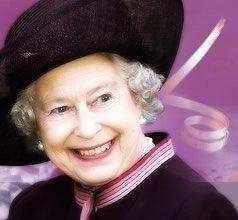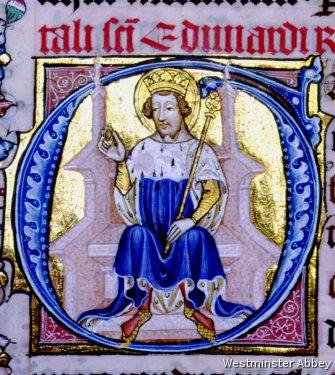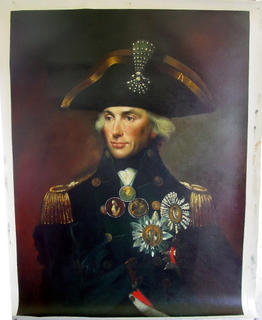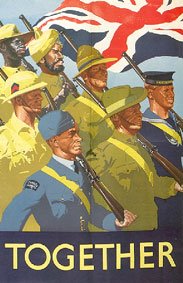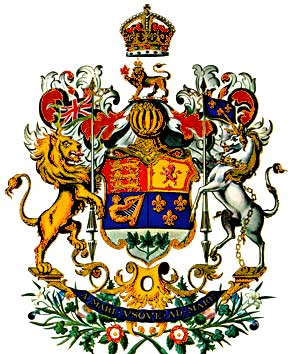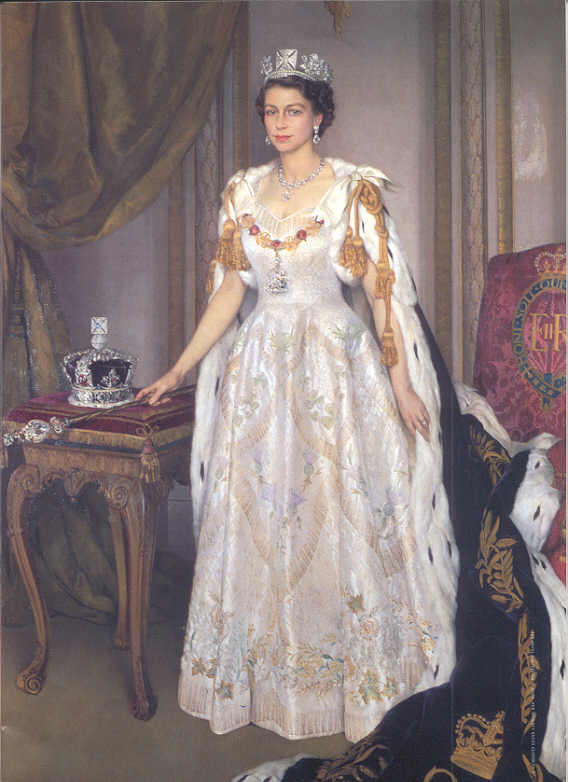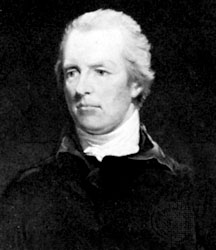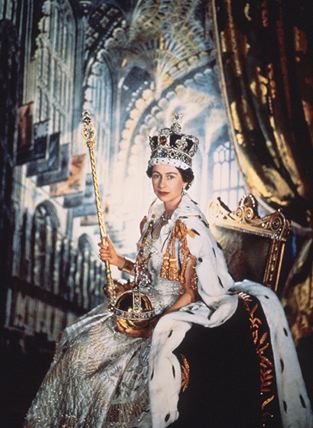[+] HONOURING OUR PATRON, SIR WINSTON CHURCHILL, VICTOR OF THE ENGLISH-SPEAKING PEOPLES
[+] HONOURING OUR QUEEN, ELIZABETH THE SECOND, ON THE 80TH YEAR OF HER BIRTH (1926 - 2006)
[+] HONOURING OUR KING, SAINT EDWARD THE CONFESSOR, ON THE 1000TH YEAR OF HIS BIRTH (1005 - 2005)
[+] HONOURING OUR HERO, LORD NELSON, ON THE BICENTENNIAL OF THE BATTLE OF TRAFALGAR (1805 - 2005)
[+] HONOURING OUR SONS, THE QUEEN'S COMMONWEALTH SOLDIERS KILLED IN THE 'WAR ON TERROR'
[+] HONOURING OUR VETS ON THE 150TH ANNIVERSARY OF THE VICTORIA CROSS (1856 - 2006)
If the violence that the Liberal government has been doing to our parliamentary heritage and democratic processes in order to sustain themselves in power is not iniquitous enough, we might want to devote more time to that other ruthless Liberal pastime: the creeping regicide of Elizabeth II of Canada. Now Her Majesty would not be the first sovereign in history to be deliberately snuffed out of existence -- to be sure, regicide is as old as the monarchy. But monarchs like Mary Queen of Scots, Charles I of England and Louis XVI of France were all found guilty, rightly or wrongly, of serious transgressions against their people. Which begs the question: what, prey tell, has Queen Elizabeth done to us?
For although in her own regal way the Governor-General has in many respects been a great foil for monarchy, her disturbing disapproval last week (no doubt with the tacit understanding of the federal government) of the Alberta Premier’s desire to have the Queen grant Royal Assent to a piece of provincial legislation, confirmed for me what I and many have suspected all along: that Governor-General Adrienne Clarkson doesn’t see herself as our country’s viceroy (she has never, insofar as I have heard, used the word publicly); doesn’t see herself as representing the Crown in Canada (she routinely refers to herself as the “Head of State”); doesn’t see herself in a subordinate role to the sovereign (she declares, for example, on the vice-regal’s website that she’s the “Commander-in-Chief” of the Canadian Forces); doesn’t even see herself as acting in the name of the Queen (under the government’s recent amendment and with her concurrence, she now sends our Canadian ambassadors abroad in her own name and not that of Her Majesty); and now, on the public record of refusing to permit the Queen of Canada to grant Royal Assent to a piece of Alberta legislation because it would be "unprecedented and would not be consistent with the longstanding 'Canadianization' of our institutions". [emphasis added]
And so I asked myself: under what constitutional authority is she acting. Section 9 of the Constitution Act, 1867, for example, states that the “Executive Government and Authority of and over Canada is hereby declared to continue and be vested in the Queen.” Section 15 of the same Act goes on to state that “The Command-in-Chief of the Land and Naval Militia, and of all Naval and Military Forces, of and in Canada, is hereby declared to continue and be vested in the Queen”. Section 17 stipulates for us that “There shall be One Parliament for Canada, consisting of the Queen, an Upper House styled the Senate, and the House of Commons.” None of these sections even mention the Governor-General, and none of these sections were subsequently repealed by the Constitution Act, 1982, or by any succeeding amendments thereafter.
Nevertheless, on the point of the sovereign granting royal assent to provincial legislation, Richard Toporoski, arch-monarchist and associate professor at the University of Toronto, surprisingly had this to say:
It is fundamental to remember that according to section 17 compared with sections 69 and 71, and section 91 compared with sections 92 and 88 of the Constitution Act 1867, the Queen, and very definitely not the Governor General, is part of the Parliament of Canada, but the lieutenant governors and not the Queen are part of their respective provincial legislatures. The logical conclusion therefore, which has always been held since it became a practical issue during the presence of King George VI in 1939, is that the royal assent can be given by the Sovereign in the Parliament of Canada but not in a provincial legislature, of which she forms no part.
Section 9 of the act declares the executive government of and over Canada to be vested in the Queen and the act is therefore emphatic in enacting (e.g. sections 72 (now spent) and 82) that lieutenant governors shall carry on executive functions in their provinces in the name of the Queen.
The logical consequence of section 90, however, which reapplies section 55 to the provinces, is clearly that in their strictly legislative functions, the lieutenant governors (as their title suggests) are representatives of the Governor General, even when giving what the act is clear in calling "the Queen's assent".
The Fathers of Confederation obviously desired that the Queen's overriding constitutional presence should be felt even at the provincial level, but it should be remembered that they intended to create a highly centralised union divided into provinces, not a federation of conjoined states, as in the United States or the later Commonwealth of Australia.
The Fathers of Confederation therefore purposely cut the provinces off from any direct connexion (at that time through the British Government) with the Queen. The provincial lieutenant governors were no longer to be appointed by the Queen but by the Governor General.
Assuming Professor Toporoski is correct in his interpretation, the implication is rather quite bizarre: that provincial lieutenant governors have authority to act in the name of the Queen, but that the Queen herself has no such authority. He goes on to back these assertions up with some concrete examples:
W. A. C. Bennett, Premier of British Columbia in the 1950s, requested that the Queen should open the Legislature of British Columbia and it was explained to him then that this was constitutionally impossible... As recently as 1987 the Queen held "court" in Vancouver and signed her royal warrant to augment the arms of British Columbia. But the proclamation, running in the Queen's name, bringing the arms into effect was signed, in the Queen's presence, by the Lieutenant Governor of British Columbia.
So it would seem by this at least, that the Governor-General's claim that such an act by the Queen would be "unprecedented", was, in this case, actually a correct one. However, if constitutional legalities were the main preoccupation of Her Excellency, she should obey them fully, and disabuse herself of the notion that she's somehow our "de facto Head of State" and "Commander-in-Chief". Madame Clarkson is quite openly acting the role of a usurper and a pretender here, which is a direct assault on the Constitution and the Queen's position. It is also bunk of the highest order that Her Majesty should be seen to undertake less and less of her official duties in the Canadian context, in order to comply with the GG's bogus determination to "Canadianize" our institutions. This is code for de-monarchizing Canada and surreptitiously suffocating the royal establishment of its rightful, historical legtimacy.
And just to provide a sample consistent with long-term Liberal intentions, Ted McWhinney, a former Liberal MP, recently went so far as to suggest that our sovereign and constitutional system of government could be rendered obsolete through a deceitful act of Parliamentary omission, by simply not proclaiming the next king to be the rightful Sovereign of Canada:
A more practical and viable strategy, argues Mr. McWhinney, would be for the federal government to act "more subtly and by indirection, through creating new
glosses on the Law of the Constitution as written, without formally amending it. "That is, a future government of Canada would, after the Queen ends her reign,
cut ties with the monarchy "quietly and without fanfare by simply failing legally to proclaim any successor to the Queen in relation to Canada."
How convenient; for the Liberals that is. Does this sound like someone who could be trusted to preserve our democratic freedoms? ..."subtly and by indirection"..."quietly and without fanfare"... Not on your life. We should be deeply suspicious why they are attempting to remove the one person who can. This is what I have come to expect from the Liberals: the abuse of power, erosion of ethicacy, assault on our traditions, heritage and institutions, the bribing and cajoling of citizens and the annointing of hacks to rule over us in their own ungodly name. For Liberals in general, Her Majesty is nothing more than an impediment to their further disgrace. Her removal, however gradual, is undemocratic and unconstitutional at best and blatantly regicidal at worst.


